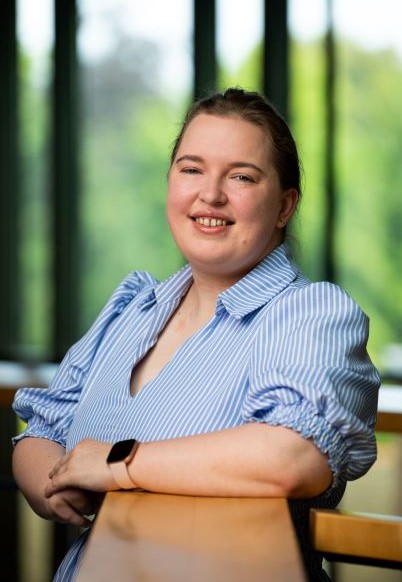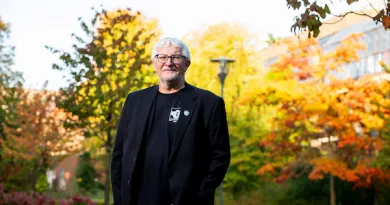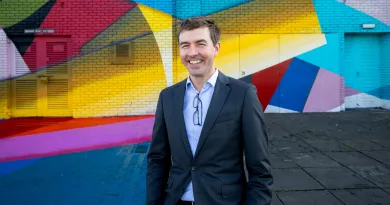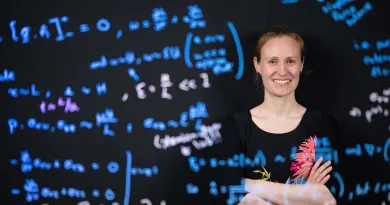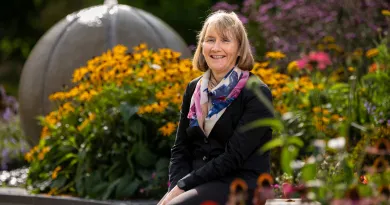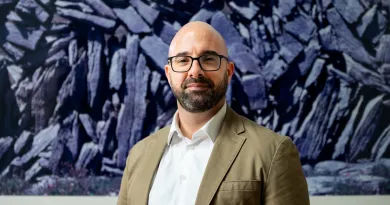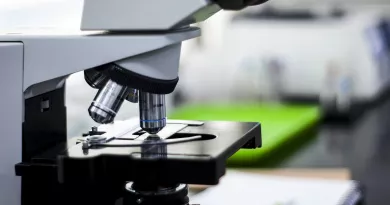Sarah Guerin is Associate Professor in Sustainable Energy Harvesting in the Department of Chemical Sciences in University of Limerick.
She is working on computationally-guided crystal engineering of organic crystals for pharmaceutical and energy harvesting applications.
Sarah is Principal Investigator and Head of the Actuate Lab in UL's Bernal Institute, an ERC Starting Grant Fellow and an SSPC Funded Investigator.
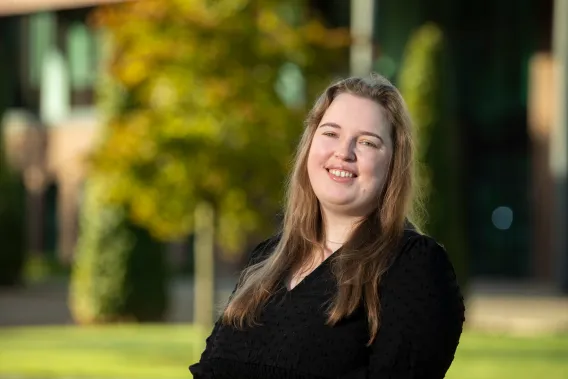
It’s about the curiosity and the discovery and the excitement of science.
Sarah says the climate crisis means researchers must act now as we deal with one of the world’s grand challenges.
I think a researcher is somebody who is trying to solve problems, somebody who enjoys discovering new things. I think there’s a curiosity and a desire to learn around being a researcher and experiencing even if it’s for 30 seconds of being the first person on the planet to figure out how something works or to know what happens at the smallest scale of something is very exciting.
My research it looks at a certain type of sensing material. It’s a type of sensor called piezoelectric sensors, which essentially means you’re intercoverting a force and an electrical signal.
However, the materials that are currently used for this contain lead. It’s one of the few places on earth that we still have lead at a consumer level.
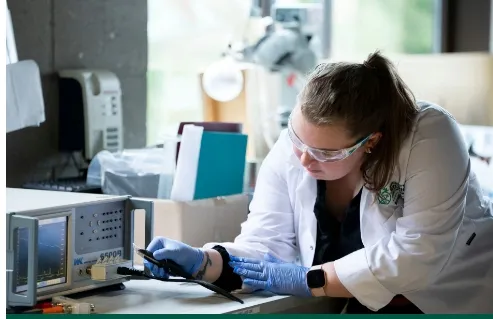
My research focuses on much more eco friendly materials to use for that specific sensing applications and a big part of my research is predicting how materials will behave so we’ve developed these really novel computer models that can predict how materials behave before we even make them in the lab. So that allows us to work with a lot of research groups around the world to help them predict how their materials are going to behave before they actually even use them.
The materials that are currently being used for the applications that I’m focusing on generate about 4,000 tonnes of toxic electronic waste a year. My goal would be in the next three to five years to see our materials replacing those in a lot of consumer applications to slowly hopefully eradicate that 4,000 tonnes of e-waste that are in landfills and in groundwater and in the environment around us.
Piezoelectric materials are really unique and that they’re used for a lot of very day-to-day applications and then a lot of very advanced applications. You’ll find them in atomic force microscopes and other very precise scientific equipment. But you also find them in every barbecue lighter, but also every microphone in your phone and your laptop so because they have this very simple conversion of energy they’re actually used in thousands of applications.
Once we perfect what we’re doing you’ll find them in phones and laptops and medical devices, and they also have kind of these new applications. Because the materials we’re using our biodegradable and biocompatible you could also have this energy force conversion inside the body.
So not only can we relace all these ubiquitous kinds of barbecue lighters or scientific equipment sensing applications, we can also do things like detecting things inside the human body or pacemakers that are powered by the beating of your heart because the heart beating will generate the electrical signal that will power the pacemaker, so you won’t have to get a surgery to replace the battery in those kinds of medical devices. From the very small to the very big there’s literally thousands of applications.
Creating that spark
Not only do I like the experience of doing science and being in the lab but I think particularly at this stage of my career I’m really enjoying creating opportunities for others to do science and for combining research and teaching in UL.
I get to walk out of the research lab into the classroom and then teach students about the science that I’m doing and try to spark in them the same joy that we get when we do science a hundred metres down the road in the lab.
It’s about the curiosity and the discovery and the excitement of science.
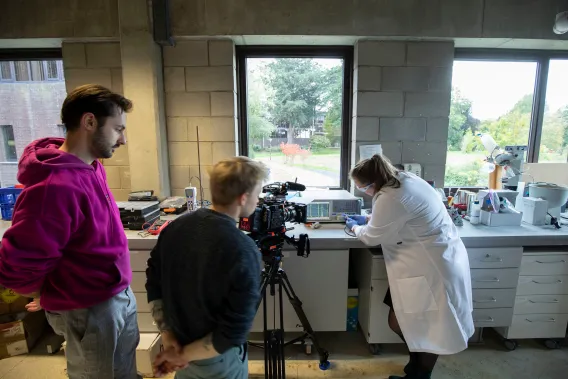
I think what we do in the lab is a workflow. So there’s a couple of stages and there’s been moments where we’ve predicted something using a computer model and then I’ve gone in the lab and I’ve made the material and I’ve seen the exact number the exact property that we predicted using the computer models on a machine in the lab and that never gets old for me.
The ongoing joy
I think we’ve had maybe five or six of them now and every time it’s the same level of, “I can’t believe I get to do this, or I can’t believe that this works”. So, for me, it’s being able to control and engineer things at this really small scale and being able to see things go from something that you build sitting at a computer at your desk to making it into a functional device that can go into a medical device, or they can go into a phone or a laptop. This hasn’t stopped being meaningful for me, it hasn’t stopped being exciting.
I think I like the idea of making real change in the world. I like looking forward and seeing my device be in somebody’s electronic device or I like the idea of making kinds of medical devices that have never been done before, to open up avenues that have never been explored before. I think day to day I think I just I love the idea of running this big research group.
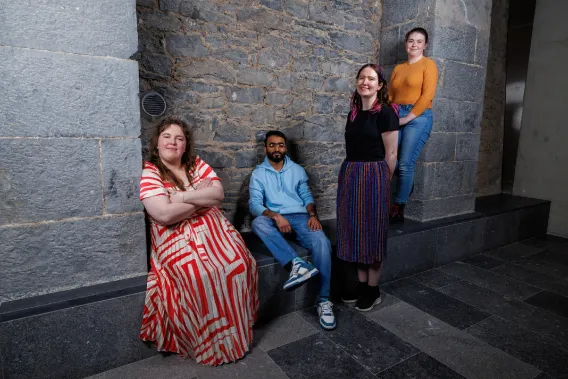
The power of mentoring
I think there’s a couple of great mentors and examples currently in University of Limerick. And I look forward to having this really kind of flourishing natural research group in which everybody is solving a different problem and everybody’s working together on the idea of building this scientific team here in the university is something that I’m really looking forward to.
I think it’s a two-way street; I think I’m at the stage in my career where I’m starting to become a mentor and to get people into my group. So that’s been fun, and it’s been challenging. I think becoming a mentor is not an immediate thing. It’s not something you become overnight. I think creating opportunities for people to do science and to find joy in science is really fun.
And on the other side something that I say a lot is the research will always get done if we have the funding and the infrastructure, but I think mentorship is about creating an environment for people want to come in and do the science everyday and people want to come in and make these discoveries.
So I think a lot of mentorship is more about creating a culture and an environment, and I think also to become a good mentor you have to have seen good mentorship in action and I think as somebody who’s been in UL for 10 years now, I can see the mentors who really shaped me and who were role models as well as mentors for me when I’m now starting my own group and my own career as a principal investigator.
The people are key
I think we’ve really rich Venn diagram, if you will, of supports that we have in UL and I think, specifically in science we have the Department of Physics where I did my undergraduate degree and really come through all the way to setting up my own group. And we also have the Bernal Institute which I think is where a lot of our big exciting infrastructure is and some of our world leading characterisation equipment is something we rely on a lot but it’s the individuals that are important.
When you’ve been in UL for this long, you get to know who to contact for the specific thing that you need and I think there’s a really natural environment for collaboration and for developing the things that we want to advance., So I think it’s things like the Research Office but it’s things like Scholars (a UL bar and restaurant on campus), It’s things like yeah, it’s the people that you talk to every day, from the admin staff to the instrument scientists in Bernal and I think there’s a nice ecosystem of support around.
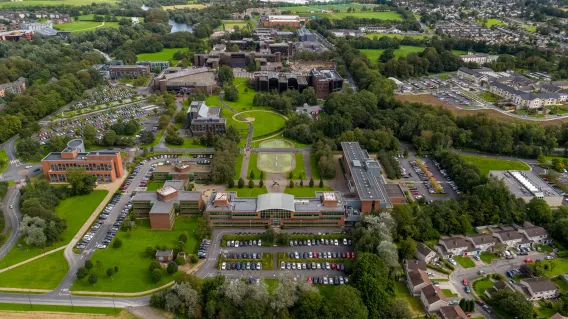
Excitement as things grow
I think I’m enjoying watching my own research group grow very naturally grow similar to the direction that the university is looking to grow. I’ve done my undergraduate here [in UL] and my PhD and I’ve had a nice journey through the university, so I think I am enjoying growing as the university grows. And I think it’s been fun and exciting.
I think my being kind of a young and ambitious researcher ties in with UL being a young and ambitious university. It’s exciting to be working in a university that’s currently growing and getting bigger and that has its own sustainable vision for how it’s going to be in five to ten years.
Not seeing is as important as seeing
Having an impact in research can be in the smaller things and mightn’t be something people realise that we are doing. But the idea that we’ll be working on projects like carbon capture and sustainable materials, we’re creating these opportunities to make a better future for everybody around us and for future generations. In a nice way I think that if we do it right, nobody will know that we’ve done it.
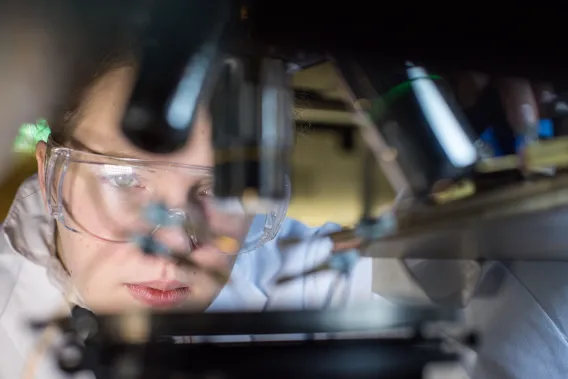
No longer an option
I think sustainability is a grand challenge for our society because I think we’re the generation that has to solve climate change. I don’t think it’s this idea that we talk about anymore. I think this generation of researchers are the people who don’t have a choice in whether we have to do something about it or not.
I think creating a sustainable society is much more than individual action or even things that are going to happen on a systematic level. I think it’s about scientists making a sustainable society the easy option for people. It’s about us advancing these technologies and these materials and I think in the university that spans sustainable materials, fuel cells, batteries and carbon capture among others. I think University of Limerick and Limerick could become this test bed and this ecosystem for a sustainable society so that we can widen that out to take on the grand challenge.
The reason it is a grand challenge is because we don’t have a choice anymore. We have to do something, and we have to take action in the research that we’re doing.
Shift in mindset
I think hopefully people are starting to shift their mindset towards, if not wanting, then needing a sustainable society so I think the research that we do while creating more eco-friendly materials is also creating more high-performance materials so that we’re not swapping them out for inferior but environmentally friendly applications.
We’re saying, “No, this material is better, it will give you better performance and it’s better for the environment,” and that’s really what’s on us as scientists to make what we do beneficial to people outside of its environmental impact so that we’re improving people’s quality of life, be that through medical devices or just better phone performance or better signal on their Wi-Fi. It’s about making people’s lives easier while making their quality of life better.
Clear voice + consistent message = success
I think it’s a difficult time to be a scientist. I think to get people to listen about the climate crisis and to get people to notice that it’s happening now. It’s an everyday job for us, and I think what I’ve learned is that you have to step away from the internet and step away from these microcosms of people who are insistent on not listening.
And I think you have to meet people day to day, and show them your research and you have to show them the impact of your research and you’ve to meet people on a human level to look around and see the effects that the climate crisis is having. I think it’s a full tine job to kind to meet people day to day and show them how it’s having an impact on their lives and how it will have and impact in the short term - that it’s not this 50-year problem anymore. It’s around the corner and I think people need to see it happening around them and that’s challenging for us to show them how it’s affecting everyday Irish people.
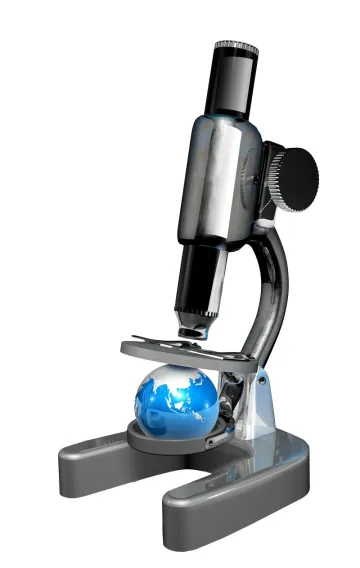
Opportunities abound
I think Ireland’s very uniquely placed to become a world leader. I think in a number of fields, but for us the materials that we’re proposing for these application are already being made by the tonne every day in our pharmaceutical companies. So particularly for this new sensing material, I think Ireland could really become a hub for its production and its implementation. These materials are so simple that you could make them at home and that’s something that we’re doing with this project. We’re going to be sending out kits to homes around Ireland starting in UL and Limerick so people can make these sensors at home.
I think even that kind of impact of homes and families around Ireland being able to make this themselves and also the amount of industry connections that we have in the university for the pharmaceutical industry, this is going to be an exciting time. I think there’s an avenue even in three to five years of this really taking of as an Irish-led sustainable material.
Society continues ‘as normal’
Hopefully the human impact we will be creating is a sustainable society where life can just continue and can be where we’re not living with the consequences of climate change in the future. But I’d also take that in the more specific direction for us with the medical devices, and I think of personalised medicine and of people not having to go for surgeries to replace batteries because all of our medical devices will be self-powered. I think it goes from the very grand challenge of climate change down to somebody not having to go for an extra surgery for a condition that they have.

Ah go on go on go on
I’d encourage anybody who’s thinking of taking on research at any form for any length of time to do it. I think it’s one of the most rewarding careers you can have. Whether you’re a scientist or a PhD student or running a lab or an undergraduate student in a lab I think everybody who tries to push the boundaries of knowledge are always going to have a fun time and are always going to be rewarded for it. I would encourage anybody to take on research in whatever form they can even if that’s in your day-to-day life.
Curious about Sarah Guerin's research
